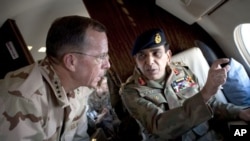The top U.S. military officer, Admiral Mike Mullen, spent more than two hours Saturday flying over Northern Pakistan with his counterpart, General Ashfaq Kiyani, to get a bird's eye view of some of the rough terrain where Pakistani forces are taking on insurgent groups. The aerial tour was part of a 24-hour visit - the 19th by Admiral Mullen since he took office 2.5 years ago.
Admiral Mullen says the flight gave him greater appreciation for the "degree of difficulty" Pakistani forces face as they battle insurgent groups and try to assert government control in areas where tribal leaders have reigned and insurgents have sometimes had free access.
Another U.S. military official, who spoke on condition of anonymity, said the Pakistani forces have cleared about 4,000 square kilometers of insurgents, about half of the area where the militants operated as recently as 16 months ago.
But the officer says the scope of the military operation is not as important as the civilian follow-up, designed to convince the local people to help the government keep the insurgents out in the future. And the officer says while Pakistan has done more than anyone could have expected, there are still more things the United States would like the Pakistani forces to do, including targeting insurgent groups that attack U.S. forces in Afghanistan and conduct international terrorism.
Admiral Mullen says he often discusses that with Pakistani officials, particularly the U.S. desire for a crackdown on the group Lashkar-e-Taiba, which is accused of carrying out the Mumbai attacks in India in 2008.
"I try to actually make the case, as I talk, that this is a growing threat," he said. "It's an organization that is becoming more lethal, proven so. It's not just operating where it used to be. It's expanding. It's in the West here [in Pakistan]. It's in Afghanistan now. It's in other countries. And I've seen this kind of expansion in other organizations, and I think we all have to be concerned about it."
During a briefing with Pakistani and international reporters, Admiral Mullen stressed that the United States will not leave the region next July, when President Barack Obama has said he will begin to withdraw U.S. troops from Afghanistan. Admiral Mullen said that process that will take years, and the United States' "strategic partnership" with the region "will endure."
He also expressed support for Afghan President Hamid Karzai's reintegration and reconciliation processes for insurgents and their leaders, saying that is how the conflict will truly end. But the admiral said the Afghan government and its coalition supporters are far from being in a strong enough position to negotiate successfully with militant groups like the Haqqani Network. " We need to be in a much stronger position to, in fact, get to a point where we reconcile with organizations like that," he said.
Admiral Mullen said the final several thousand U.S. surge forces will be in Afghanistan soon, and he believes he will know much more by the end of the year about whether the strategy President Obama announced last December is creating that 'stronger position.' The admiral will travel to Afghanistan Sunday to personally assess the situation.











